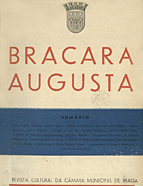

................................
Thus, the dissemination of history was also greatly promoted, as evidenced by the publication of the proceedings of the Congresso Histórico de Portugal Medievo [ Historical Conference of Medieval Portugal] (Braga, 1959), jointly organised by the local council, the Sociedade Histórica da Independência de Portugal [ Historical Society for the Independence of Portugal] (Braga Delegation) and the Faculdade Pontifícia de Filosofia de Braga [Pontifical School of Philosophy of Braga]. In this field of action, multiple historiographical conclusions can be found in other proceedings published by Bracara Augusta , namely the I Congresso Internacional de Estudos Martinianos [First International Conference on Martinian Studies] (1950), the Congresso Comemorativo do IV Centenário do Nascimento de Francisco Sanches [Conference Commemorating the Fourth Centenary of the Birth of Francisco Sanches] (1951), the III Congresso Espanhol de Arqueologia [Third Spanish Conference of Archaeology] (1953), the Colóquio Bracarense de Estudos Suévico-Bizantinos [Bracarense Colloquium on Suevo-Byzantine Studies] (1957), the Congresso de Estudos da Comemoração do XIII Centenário da Morte de S. Frutuoso [Conference of Studies Commemorating the 13th Centenary of the Death of St. Frutuoso] (1966) and the Congresso “A Arte em Portugal no Séc. XVIII” [ Conference “Art in Portugal in the 18th Century”] (1973), without excluding other academic initiatives also held in Braga.
Despite the invaluable wealth of Bracara Augusta , bibliographical references to the editorial history of this municipal periodical remain scarce and difficult to find. This seems to be a real contradiction, as it remains a leading example in its field and there is almost no work exclusively dedicated to this essential periodical. We therefore consider it urgent to encourage research in this area, which could support master’s and doctoral theses with fruitful results, providing new hermeneutic perspectives on the strategic and scientific choices of this publication, including the subtleties and historiographical nuances of its publishing activity, which has been tireless in promoting history and culture.
This work is financed by national funds through FCT - Foundation for Science and Technology, I.P, in the scope of the projects UIDB/04311/2020 and UIDP/04311/2020.
